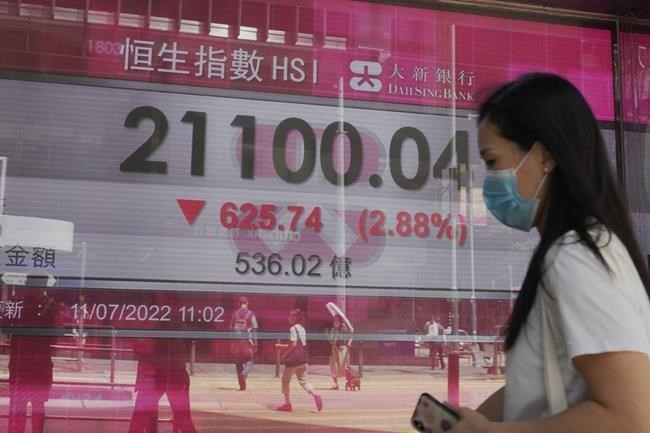NEW YORK (AP) ŌĆö Stocks are opening lower on Wall Street as markets turn cautious ahead of earnings reports from big U.S. companies starting this week and more reports that will show how badly inflation is hitting American businesses and households. The S&P 500 fell 1.1% in the early going Monday, while drops in technology stocks helped send the Nasdaq composite down 2%. The Dow Jones Industrial Average gave back 0.5%. Twitter sank 7% after Tesla CEO Elon Musk said he would abandon his deal to buy the company, while Twitter said it would sue the billionaire to enforce his commitment to the purchase.
THIS IS A BREAKING NEWS UPDATE. APŌĆÖs earlier story follows below.
NEW YORK (AP) ŌĆö U.S. futures are down with corporate earnings season kicking off this week amid rising anxiety over how companies are navigating soaring inflation, and news about the spread of a .
Also this week, the U.S. will release fresh data about rising costs for both companies and families with near four-decade highs.
Futures for the Dow Jones industrials fell 0.6% and futures for the S&P 500 slid 0.7% before Monday's opening bell.
Shares are sinking in Europe at midday after most Asian markets also fell, with the exception of JapanŌĆÖs benchmark, which rallied after the ruling Liberal Democratic Party garnered a landslide parliamentary election victory.
The euro sagged closer to parity against the U.S. dollar, dipping nearly 1% to $1.0091. EuropeŌĆÖs shared currency is at its lowest level in 20 years against the U.S. dollar, hit by worries over possible recession and the surge in the greenback as the Federal Reserve raises interest rates to combat inflation.
The U.S. dollar rose to 137.15 Japanese yen from 136.10 yen.
Germany's DAX fell 1% as the to Germany for annual maintenance brought concern Russia might not resume the flow of gas as scheduled.
In Paris, the CAC 40 declined 0.8%, while Britain's FTSE 100 lost 0.4%.
Wall Street had a sputtering finish last week, as global markets eyed Chinese economic indicators and maneuvers by central banks, including the U.S. Federal Reserve, to contain stubborn inflation.
On Friday, the S&P 500 dropped 0.1% and the Dow also fell 0.1%, while the Nasdaq rose 0.1%. The Russell 2000 index of small company stocks slipped less than 0.1%.
ŌĆ£A recession is not the marketŌĆÖs base outlook, but until proven otherwise, investors will debate the depth of the growth hit, not the likelihood of recession; thus, good economic data is good news for stocks,ŌĆØ Stephen Innes of SPI Asset Management said in a commentary.
China reports its April-June growth data on Friday, and an update on U.S. inflation is due Wednesday. Investors also are watching for upcoming corporate earnings reports, which will give investors insight into how inflation is impacting businesses and consumers. Banks, airlines and health care companies start reporting midweek.
COVID-19 infections are also surging in some areas. The Asian gambling center of Macao will close all its casinos for a week starting Monday and largely restrict people to their homes as it tries to stop a COVID-19 outbreak that has infected more than 1,400 people in the past three weeks.
The quickly changing coronavirus has spawned yet another super contagious omicron mutant thatŌĆÖs worrying scientists as it gains ground in India and pops up in numerous other countries, including the United States, Australia, Germany, the United Kingdom and sa╣·╝╩┤½├Į.
Scientists say the variant ŌĆō called BA.2.75 ŌĆō may be able to spread rapidly and get around immunity from vaccines and previous infection.
This week, major airlines, banks and health companies will post quarterly earnings and the U.S. will post data on consumer and producer prices.
Asian shares were mostly lower on Monday, though Japan's benchmark Nikkei jumped 1.1% to 26,812.30.
JapanŌĆÖs governing party and its coalition partner which came two days after the Abe was shot by a man emerging from the crowd listening to his campaign speech, took out a homemade gun and fired.
The attack shocked a nation that rarely sees gun violence. The Liberal Democratic Party was bound for victory even before the assassination, but some analysts said the shock of Abe's death was likely to strengthen that trend.
AustraliaŌĆÖs S&P/ASX 200 declined 1.1% to 6,602.20. South KoreaŌĆÖs Kospi lost 0.4% to 2,340.27.
Hong KongŌĆÖs Hang Seng slipped 2.8% to 21,124.20, while the Shanghai Composite fell 1.3% to 3,313.58.
Technology shares fell after market regulators in China fined companies for not reporting past transactions as required. E-commerce giant Alibaba tumbled 6.8% while Tencent Holdings lost 3.2%.
Shares in Twitter before the open Monday after Elon Musk announced late Friday that he will abandon his $44 billion offer to buy the social media company because he said it failed to provide enough information about the number of fake accounts. Twitter said it would sue the Tesla CEO to uphold the deal, and a titanic legal battle likely lies ahead.
In energy trading, U.S. benchmark crude lost $2.37 to $102.42 a barrel. It gained $2.06 to $104.79 a barrel on Friday.
Brent crude, the international standard, fell $1.78 to $105.24 a barrel.
Yuri Kageyama, The Associated Press



